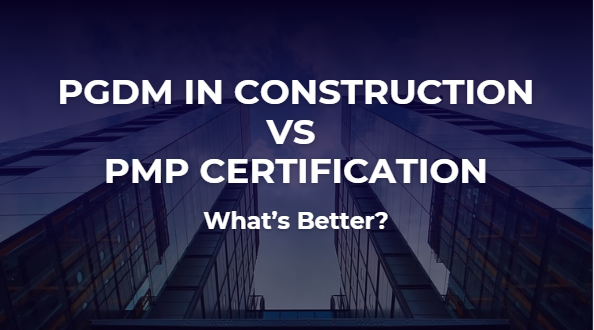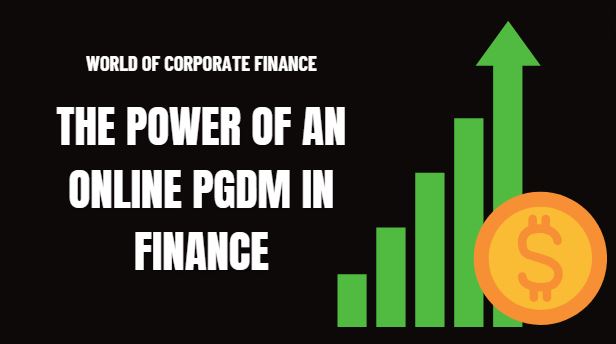
Obtaining a PMP certification or pursuing a PGDM in Construction and Project Management are the two main choices that stand out when it comes to developing your career in the construction sector. Understanding their distinctions and how each may affect your future in the field is essential because both provide unique benefits and satisfy various career goals.
We will compare the scope, advantages, and career results of both alternatives in-depth in this blog. To assist you make an informed choice, we’ll go over what each involves, the abilities they help you develop, and the opportunities they present.
What is PGDM in Construction and Project Management?
The extensive information and abilities needed to manage construction projects are the main emphasis of a specialist Post Graduate Diploma in Management called a PGDM in Construction and Project Management. This program is intended for people who want to improve or develop their managerial abilities, especially in the construction industry. Project planning, risk management, construction technology, contract management, and construction-related financing are just a few of the topics it usually covers.
For individuals who want to advance into senior management positions in the construction sector, such as project managers, construction managers, or even entrepreneurs hoping to launch their own construction businesses, this course is perfect.
What is PMP Certification?
However, the Project Management Institute (PMI) offers the internationally recognized PMP (Project Management Professional) certification. Professionals who are currently employed in project management positions who wish to demonstrate their proficiency in successfully managing projects can apply for the PMP certification. Construction is one of the many businesses that can benefit from the certification’s emphasis on project management best practices, tools, techniques, and principles.
PMP is more of a professional credential that shows your ability to manage projects in an organized and effective way than a PGDM, which is an academic degree. It’s perfect for people who want to grow in their jobs or get acknowledged for their abilities and already have practical project management expertise.
PGDM vs PMP: What’s the Difference?
The depth, focus, and target audience are the main distinctions between a PMP certification and a PGDM in Construction and Project Management.
Duration and Scope:
- A PGDM program is a comprehensive, multi-year course that focuses on the construction sector while covering a wide range of business management abilities. Theory, hands-on training, internships, and leadership development are all included.
- In contrast, PMP is a more condensed and targeted certification that typically requires just a few months of study. It is more focused on project management than a PGDM, but it is still less general.
Target Audience:
- Those who are either new to the field or seeking to further their career with advanced management abilities are the target audience for the PGDM in Construction Management.
- Professionals with previous project management expertise who want to codify their abilities and obtain recognition on a global scale might consider becoming a PMP.
Curriculum Focus:
- A thorough examination of the financial, human resource, and legal facets of the construction sector is provided by PGDM programs.
- Standardized project management techniques, tools, and practices that are applicable to all industries—not only construction—are the main focus of PMP.
Recognition and Reach:
- The PGDM in Construction Management is well-known in the field and is excellent for people who want to become experts in management positions related to construction.
- Because PMP is widely accepted in many different businesses, it’s a more flexible credential if you wish to work in a variety of fields.
Benefits of PGDM in Construction Management 🏢
For those looking to advance in the construction industry, a PGDM in Construction Management offers several benefits:
- Thorough Industry Knowledge: Students enrolled in a PGDM program gain a thorough understanding of every stage of a construction project’s lifespan, from planning and design to execution and conclusion.
- Development of Leadership Skills: Students receive instruction in team management and leadership techniques that are critical for managing major construction projects. It gives them the tools they need to manage difficulties and guide interdisciplinary teams.
- Better Career Opportunities: Senior positions like project managers, construction managers, and consultants are in high demand for graduates with a PGDM in construction. For leadership roles, many organizations favor applicants with a strong academic foundation in construction management.
- Networking chances: Enrolling in a PGDM program, particularly from a reputable university like MITSDE, gives you access to beneficial networking chances with professionals in the field, enabling you to form significant relationships.
Career Scope After PGDM in Construction Management 🎯
Numerous professional options become available once earning a PGDM in Construction Management. Among the crucial positions are:
- Construction Project Manager: Charged for supervising construction projects and guaranteeing their timely, cost-effective, and specification-compliant completion.
- Construction managers: oversee all aspects of construction projects, including scheduling, safety compliance, and resource allocation.
- Real Estate Development Manager: Managing the building and development of residential or commercial properties.
- Site managers and engineers: In charge of managing daily operations at building sites and making sure that everything runs smoothly and safely.
- Consultant: Offers knowledgeable counsel on a range of construction project management topics, such as compliance, risk management, and budgeting.
PMP Certification vs PGDM Salary Comparison 💰
Although both the PMP certification and the PGDM in Construction Management offer profitable career pathways, the pay opportunities are different:
- Graduates of PGDM programs usually begin in managerial positions, earning between ₹6 and 12 lakh annually, depending on experience and the kind of business.
- Professionals with a PMP certification can make more money because of the certification’s widespread reputation. In India, professionals with PMP certification typically earn between ₹10 and ₹20 lakh annually.
Best Courses for Construction Project Management
The following are some of the top courses available if you want to advance your profession in construction project management:
- Institutions such as MITSDE provide a specific program called PGDM in Construction Management.
- The internationally recognized PMP Certification is offered by PMI and can be obtained through a variety of in-person and online training courses.
- Professionals wishing to acquire the fundamentals of project management can benefit from a diploma in project management.
- A master’s degree program for individuals who wish to investigate more complex construction management ideas is the MSc in Construction Management.
Which is Better for You? PGDM or PMP?
Choosing between a PGDM in Construction Management and PMP certification is largely determined by your job goals and desired level of knowledge.
A PGDM in Construction Management can be the best option for you if you want to pursue a thorough, academic approach to construction management with the goal of advancing into leadership positions. On the other hand, PMP might be the best option if you currently work in project management and would like to formally demonstrate your proficiency with a globally accepted certification.
For those seeking top-tier education in construction management, MITSDE offers the best institute for PGDM in construction management.



